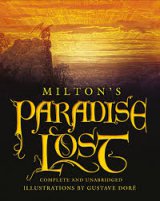Paradise Lost Page #22
Paradise Lost is an epic poem in blank verse by the 17th-century English poet John Milton. The first version, published in 1667, consisted of ten books with over ten thousand lines of verse. A second edition followed in 1674, arranged into twelve books with minor revisions throughout and a note on the versification.
Which of those rebell Spirits adjudg’d to Hell Com’st thou, escap’d thy prison, and transform’d, Why satst thou like an enemie in waite Here watching at the head of these that sleep? Know ye not then said Satan, filld with scorn, Know ye not me? ye knew me once no mate For you, there sitting where ye durst not soare; Not to know mee argues your selves unknown, The lowest of your throng; or if ye know, Why ask ye, and superfluous begin Your message, like to end as much in vain? To whom thus Zephon, answering scorn with scorn. Think not, revolted Spirit, thy shape the same, Or undiminisht brightness, to be known As when thou stoodst in Heav’n upright and pure; That Glorie then, when thou no more wast good, Departed from thee, and thou resembl’st now Thy sin and place of doom obscure and foule. But come, for thou, be sure, shalt give account To him who sent us, whose charge is to keep This place inviolable, and these from harm. So spake the Cherube, and his grave rebuke Severe in youthful beautie, added grace Invincible: abasht the Devil stood, And felt how awful goodness is, and saw Vertue in her shape how lovly, saw, and pin’d His loss; but chiefly to find here observd His lustre visibly impar’d; yet seemd Undaunted. If I must contend, said he, Best with the best, the Sender not the sent, Or all at once; more glorie will be wonn, Or less be lost. Thy fear, said Zephon bold, Will save us trial what the least can doe Single against thee wicked, and thence weak. The Fiend repli’d not, overcome with rage; But like a proud Steed reind, went hautie on, Chaumping his iron curb: to strive or flie He held it vain; awe from above had quelld His heart, not else dismai’d. Now drew they nigh The western point, where those half-rounding guards Just met, & closing stood in squadron joind Awaiting next command. To whom thir Chief Gabriel from the Front thus calld aloud. O friends, I hear the tread of nimble feet Hasting this way, and now by glimps discerne Ithuriel and Zephon through the shade, And with them comes a third of Regal port, But faded splendor wan; who by his gate And fierce demeanour seems the Prince of Hell, Not likely to part hence without contest; Stand firm, for in his look defiance lours. He scarce had ended, when those two approachd And brief related whom they brought, wher found, How busied, in what form and posture coucht. To whom with stern regard thus Gabriel spake. Why hast thou, Satan, broke the bounds prescrib’d To thy transgressions, and disturbd the charge Of others, who approve not to transgress By thy example, but have power and right To question thy bold entrance on this place; Imploi’d it seems to violate sleep, and those Whose dwelling God hath planted here in bliss? To whom thus Satan with contemptuous brow. Gabriel, thou hadst in Heav’n th’ esteem of wise, And such I held thee; but this question askt Puts me in doubt. Lives ther who loves his pain? Who would not, finding way, break loose from Hell, Though thither doomd? Thou wouldst thy self, no doubt, And boldly venture to whatever place Farthest from pain, where thou mightst hope to change Torment with ease, & soonest recompence Dole with delight, which in this place I sought; To thee no reason; who knowst only good, But evil hast not tri’d: and wilt object His will who bound us? let him surer barr His Iron Gates, if he intends our stay In that dark durance: thus much what was askt. The rest is true, they found me where they say; But that implies not violence or harme. Thus hee in scorn. The warlike Angel mov’d, Disdainfully half smiling thus repli’d. O loss of one in Heav’n to judge of wise, Since Satan fell, whom follie overthrew, And now returns him from his prison scap’t, Gravely in doubt whether to hold them wise Or not, who ask what boldness brought him hither Unlicenc’t from his bounds in Hell prescrib’d; So wise he judges it to fly from pain However, and to scape his punishment. So judge thou still, presumptuous, till the wrauth, Which thou incurr’st by flying, meet thy flight Seavenfold, and scourge that wisdom back to Hell, Which taught thee yet no better, that no pain Can equal anger infinite provok’t. But wherefore thou alone? wherefore with thee Came not all Hell broke loose? is pain to them Less pain, less to be fled, or thou then they Less hardie to endure? courageous Chief, The first in flight from pain, had’st thou alleg’d To thy deserted host this cause of flight, Thou surely hadst not come sole fugitive. To which the Fiend thus answerd frowning stern. Not that I less endure, or shrink from pain, Insulting Angel, well thou knowst I stood Thy fiercest, when in Battel to thy aide The blasting volied Thunder made all speed And seconded thy else not dreaded Spear. But still thy words at random, as before, Argue thy inexperience what behooves From hard assaies and ill successes past A faithful Leader, not to hazard all Through wayes of danger by himself untri’d. I therefore, I alone first undertook To wing the desolate Abyss, and spie This new created World, whereof in Hell Fame is not silent, here in hope to find Better abode, and my afflicted Powers To settle here on Earth, or in mid Aire; Though for possession put to try once more What thou and thy gay Legions dare against; Whose easier business were to serve thir Lord High up in Heav’n, with songs to hymne his Throne, And practis’d distances to cringe, not fight. To whom the warriour Angel soon repli’d. To say and strait unsay, pretending first Wise to flie pain, professing next the Spie, Argues no Leader, but a lyar trac’t, Satan, and couldst thou faithful add? O name, O sacred name of faithfulness profan’d! Faithful to whom? to thy rebellious crew? Armie of Fiends, fit body to fit head; Was this your discipline and faith ingag’d, Your military obedience, to dissolve Allegeance to th’ acknowledg’d Power supream? And thou sly hypocrite, who now wouldst seem Patron of liberty, who more then thou Once fawn’d, and cring’d, and servilly ador’d Heav’ns awful Monarch? wherefore but in hope To dispossess him, and thy self to reigne? But mark what I arreede thee now, avant; Flie thither whence thou fledst: if from this houre Within these hallowd limits thou appeer, Back to th’ infernal pit I drag thee chaind, And Seale thee so, as henceforth not to scorne The facil gates of hell too slightly barrd.
Translation
Translate and read this book in other languages:
Select another language:
- - Select -
- 简体中文 (Chinese - Simplified)
- 繁體中文 (Chinese - Traditional)
- Español (Spanish)
- Esperanto (Esperanto)
- 日本語 (Japanese)
- Português (Portuguese)
- Deutsch (German)
- العربية (Arabic)
- Français (French)
- Русский (Russian)
- ಕನ್ನಡ (Kannada)
- 한국어 (Korean)
- עברית (Hebrew)
- Gaeilge (Irish)
- Українська (Ukrainian)
- اردو (Urdu)
- Magyar (Hungarian)
- मानक हिन्दी (Hindi)
- Indonesia (Indonesian)
- Italiano (Italian)
- தமிழ் (Tamil)
- Türkçe (Turkish)
- తెలుగు (Telugu)
- ภาษาไทย (Thai)
- Tiếng Việt (Vietnamese)
- Čeština (Czech)
- Polski (Polish)
- Bahasa Indonesia (Indonesian)
- Românește (Romanian)
- Nederlands (Dutch)
- Ελληνικά (Greek)
- Latinum (Latin)
- Svenska (Swedish)
- Dansk (Danish)
- Suomi (Finnish)
- فارسی (Persian)
- ייִדיש (Yiddish)
- հայերեն (Armenian)
- Norsk (Norwegian)
- English (English)
Citation
Use the citation below to add this book to your bibliography:
Style:MLAChicagoAPA
"Paradise Lost Books." Literature.com. STANDS4 LLC, 2024. Web. 24 Nov. 2024. <https://www.literature.com/book/paradise_lost_101>.




Discuss this Paradise Lost book with the community:
Report Comment
We're doing our best to make sure our content is useful, accurate and safe.
If by any chance you spot an inappropriate comment while navigating through our website please use this form to let us know, and we'll take care of it shortly.
Attachment
You need to be logged in to favorite.
Log In